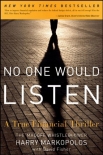No One Would Listen: A True Financial Thriller by Harry Markopolos (rainbow fish read aloud .txt) 📗

- Author: Harry Markopolos
Book online «No One Would Listen: A True Financial Thriller by Harry Markopolos (rainbow fish read aloud .txt) 📗». Author Harry Markopolos
As it turned out, Thierry had his own motive for meeting Frank Casey. While his firm was called “International,” almost all the investments managed by Access came from Europe, and Thierry was trying to raise Wall Street money. So during this first meeting with Frank, Thierry spent considerable time promoting his company. That’s probably why he was unusually candid about the business. “At first I was the hedge fund unit of a French bank in the United States,” he explained. “I built this business basically to find the best managers early in their careers and lock them up for capacity, so later when people wanted to invest with them I would have access to them. Therefore the name of our firm: Access to the best managers. That’s what we provide for our clients.”
When Frank asked him specifically about the manager who supposedly was producing a 1 to 2 percent net return each month, Thierry nodded. “It’s true. I do have this manager who’s producing a good steady one to two percent net, and I found him early in the development here. He’s my partner. But I’m sorry—I’m not supposed to tell his name to anyone. If I do he might not give me any capacity.”
That was curious. Generally, when someone is consistently able to produce such spectacular returns, they would want their name and success widely circulated. What could possibly be better for business? But this manager was threatening to turn away clients who dared mention his name. Frank asked why this manager wanted his identity kept secret.
“He doesn’t hold himself out to be a hedge fund. He has only a few large clients. Actually he’s a broker-dealer, but he’s using hedge fund strategies in his money management business.”
At that moment Frank had no reason to question any of this. And if what Thierry was telling him was true, this manager was a major find. He told Thierry, “You know, we might be interested in doing business with Access if you could put together a portfolio. If you included managers like him I probably could get the banks to guarantee the return of principle.”
Thierry liked that concept. “His name is Bernie Madoff.”
Anyone who had worked in the stock market even for a short period of time knew that name, if not his background. The company he’d founded, Madoff Investment Securities LLC, was among the most successful broker-dealers on Wall Street, specializing in over-the-counter stocks. Madoff Securities was a well-known market maker, meaning he both bought and sold stocks, making his profit by selling for a few cents more per share than his purchase price. Madoff Securities was a pioneer in electronic trading, enabling the company to rapidly move large blocks of over-the-counter stocks. But what really set Madoff apart was his willingness to pay for order flow. Normally, the difference between what market makers paid for a stock and what they sold it for was about 12.5 cents. That was their profit. But instead of taking a fee for this service, as was normally done, Bernie actually paid firms as much as two cents per share for their business. Even though he was earning a penny or two less per share, he more than compensated for that with greatly increased volume. In the early 1990s Madoff Securities was reputed to be responsible for almost 10 percent of the daily trading of New York Stock Exchange-listed securities. By the end of the decade the company was the sixth largest market maker on Wall Street. That strategy had made Madoff rich, and had enabled him to become one of the most respected men in the financial industry. He marketed himself as a cofounder of NASDAQ and had served as its chairman; he was a prominent New York philanthropist and a member of numerous industry and private boards and committees. Thierry might have been born with royal blood, but Bernie Madoff was a Wall Street king.
Frank Casey had never heard anything about Bernie Madoff managing money, though. But even more unusual was the arrangement between Access and Madoff. As Thierry explained, “I opened an account with Madoff Securities and he gets to use the money any way he wants. I’ve given him full discretion to put my client’s money with his personal money when it’s needed.”
“So basically you’re loaning him the money, right?” Frank asked.
Thierry agreed, pointing out, “It’s secured by his good name.” In other words, if you couldn’t trust Bernie Madoff with your money, then there was no one who could be trusted. Madoff’s investment strategy was a technique known as split-strike conversion, a strategy that Frank knew a lot about—and knew that by design it would produce only limited profits. There was nothing unique or exotic about the split-strike conversion strategy. Option traders often referred to it as a “collar” or “bull spread.” Basically, it involved buying a basket of stocks, in Madoff’s case 30 to 35 blue-chip stocks that correlated very closely to the Standard & Poor’s (S&P) 100-stock index, and then protecting the stocks with put options. By bracketing an investment with puts and calls, you limit your potential profit if the market rises sharply; but in return you’ve protected yourself against devastating losses should the market drop. The calls created a ceiling on his gains when the market went up; the puts provided a floor to cut his losses when the market went down. As Thierry explained, Madoff had a big advantage: “He determines what stocks to buy or sell based upon his knowledge of the market and his order flow.” In other words, he would use the knowledge





Comments (0)